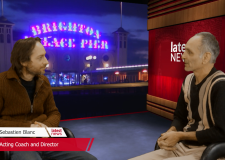Angelique Kidjo Interview
Jeff Hemmings speaks to Africa’s premier diva.
Angélique Kpasseloko Hinto Hounsinou Kandjo Manta Zogbin Kidjo commonly known as Angélique Kidjo, is a Grammy Award–winning Beninoise singer songwriter and activist, noted for her diverse musical influences, Time Magazine has called her ‘Africa’s premier diva’; the BBC has included Kidjo in its list of the African continent’s 50 most iconic figures; The Guardian has listed her as one of their Top 100 Most Inspiring Women in the World; and Kidjo is the first woman to be listed among The 40 Most Powerful Celebrities In Africa by Forbes Magazine.
Born in Contonou, Benin, her father is from the Fon people of Ouidah and her mother from the Yoruba people. She grew up listening to Beninese traditional music, and extended her influences to include afropop, Zarribean zouk, Congolese rumba, jazz, gospel and Latin. Artists such as Bella Bellow, James Brown, Nina Simone, Aretha Franklin, Jimi Hendrix, Miriam Makeba and Carlos Santana informed her musical upbringing. Kidjo is fluent in Fon, Yoruba, French, English, and sings in all four languages.
“Brooklyn is sunny and cold,” she says over the phone. “I’ve been living in New York since 1997, but it doesn’t make any difference. But I love the summer. Everyone is complaining but I say, Yeah! Bring it on. I dig it!”
Kidjo started singing at school and she found success as a teenager with her adaptation of Miriam Makeba’s Les Trois Z, which was played on national radio. She recorded the album Pretty with the Cameroonian producer Ekambi Brilliant and her brother Oscar. The success of the album allowed her to tour all over West Africa, but continuing political conflicts in Benin prevented her from being an independent artist in her own country and led her to relocate to Paris in 1983. Initially studying jazz, she met and married the musician and producer Jean Hebrail, with whom she has composed most of her music. She became front-woman of the euro-jazz rock outfit Pili Pili, released three albums, and recorded a solo album, Parakou. Island Records founder Chris Blackwell signed her in 1991, and it was with them that she recorded Logozo, reaching number one on the Billboard World Music chart. From then on, she quickly became a world music star before moving to America in 1997. “Music took me here, just music. I started my trilogy here, when I decided to make the three albums (Oremi, Black Ivory Soul and Oyaya) to travel backwards to see how much that Africa has affected the rest of the world, musically.
“The first time I came here (1991) I was preparing the album Logozo with Joe Galdo from Miami Sound Machine. My first reaction was: ‘It’s big! So much space. In Africa it’s much more jammed up, people all over the place. This magnitude of space I was really comfortable with. It does create a lack of connection though, you need to travel… like Los Angeles, which is so spread out, you spend so much time in the car going from one place to the other…”
Over the years she has recorded with the likes of Alicia Keyes, Branford Marsalis, Peter Gabriel, Bono, Carlos Santana, John Legend and Herbie Hancock, releasing a string of acclaimed and popular albums. She’s currently back in the studio making a new album. “I’m going through the songs, adding space, musicians. I’m in the process of listening back to what I have written and see what I want to take out. Less is more, for me!”
Writing is a big part of her life, and technology is playing a positive part it seems. “Thank God for the cellphone. It allows me to record ideas, When inspiration comes I can catch it, even sleeping! I’ll be half asleep, do the song in my sleepy voice, go back to sleep, and next morning I listen to it and record it better!!”
“I cannot write music when I am touring, I need to put the music somewhere where I can find it; verse, chorus, bridge, even if it’s not connected – I can come back to it later and make it better. The percussion is always there; I am always singing the percussion, the lyrics and the melody. They are, for me, a unity.”
With a simple set up of guitar, bass, drums and percussion, Kidjo has used the same touring musicians since the release of her previous album Oyo in 2010, which was nominated for Best Contemporary World Music Album at the 53rd Grammy Awards. It was an album that paid tribute to the music of her childhood in Benin. “I’m going to Benin in two weeks, after Brighton, because my new project is about women, women’s voices, so I’m going to record traditional voices. I’m going to let them sing the music I have writen, with their voice, come up with something we can put in the record.”
Since 2002 she has been a goodwill ambassador for UNICEF, and womens’ rights has been an issue close to her heart, in Benin and around the globe. “Benin has been a very stable country for a while, since 1989, when we turned from a communist dictatorship to a demcarcy. It’s the only country in Africa that made that switch without bloodshed or war. The people just said we don’t want this nonsense no more, and the dictator said, ‘OK, I will give you what you want if you don’t prosecute me’. We don’t care about prosecuting, we just wanted out freedom aback. And the military were ready to kill everyone… but when the president walked out, everyone dropped their weapons, and we were able to get our freedom.
“We are not a belligerent people, we don’t like war; we are a quiet people. it’s a small country, and we don’t want to die. But we are a stubborn people; when we don’t want something, you can be God on earth, we don’t care!”
“Benin is a matriarchial society; when it comes to making money for ourselves, we are very good at it. The Beninese women are the backbone of the country, but when it comes to women’s rights there is still a lot to do… We have the right to vote in Benin; I remember when I was 8 years old it was the concern of my Mum and a friend where they would be singing and marching and asking the president and military to let women choose, to decide for their lives. Benin is a place where you are not married at the mayor’s office – when you aren’t married legally, and you are married traditionally, you can walk away if you don’t like,” she laughs.
“The problem we have in Benin is child trafficking; most of the kids that are born in rural areas don’t have birth certificates. What I am working on with the government and UNICEF is for the men to allow the women to name the child. 75% of the farmers in Africa are women, and they don’t own the land.”
Despite continuing problems in Benin she is very proud of her country. “People are so cool, and so nice… really, really nice. It’s a peaceful place, and you’ll laugh a lot.”
She’s currently writing her memoirs, to be published by harper-Collins early next year. “It’s not easy, I have to dive into my memory and ask my brothers questions. I’m not the type of person who is going to give away too much private information. So, I have to find a balance; my brothers and sisters are still alive, my mum is still alive! If that is the kind of book they want me to write, I’m never going to write it! I don’t want to shock people to sell. I don’t do it with my music, and I wouldn’t do it with anything else.”
So, how is her mother, a woman who introduced Angelique to music and theatre at a very young age? “My mother is grooving, she’s going to be 87, and I say: ‘Mum, rest’. And she says, ‘leave me alone, I don’t want to rest’! Get yourself busy, do what you gotta do, but be careful, stay away from those motorcycles (which is the main mode of transportation in Benin). She goes anyway, doesn’t mater what you say! She still won’t wear a helmet – she says her hair do will be messed up! We all give up! My husband says, ‘are you going to be like your parents’, and I say it’s too late!”
Angelique Kidjo (with Jospehine Oniyama in support), Brighton Dome Concert Hall, Sunday 12 May, 8pm, £22.50-10. Part of Brighton Festival.





















